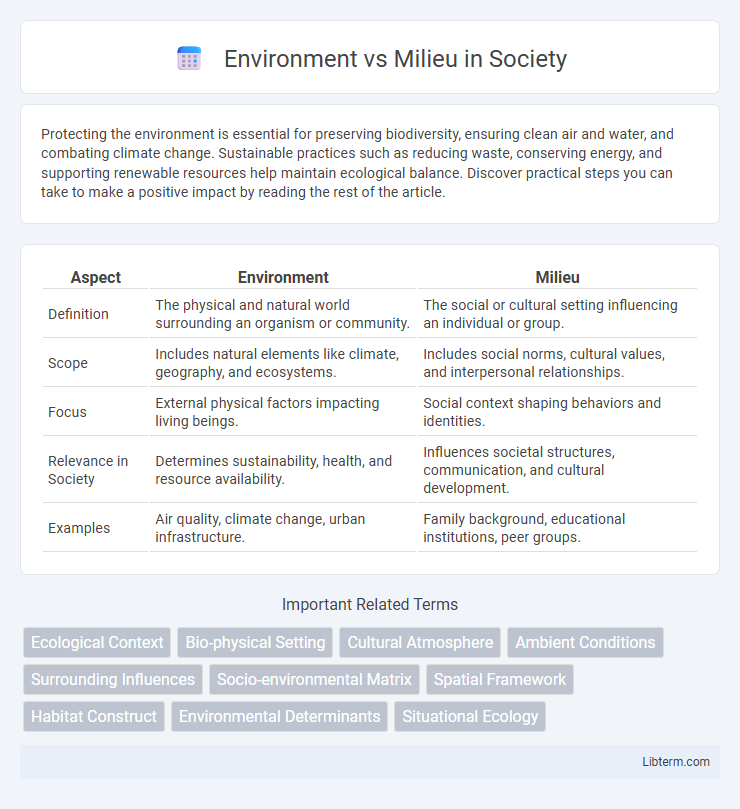Protecting the environment is essential for preserving biodiversity, ensuring clean air and water, and combating climate change. Sustainable practices such as reducing waste, conserving energy, and supporting renewable resources help maintain ecological balance. Discover practical steps you can take to make a positive impact by reading the rest of the article.
Table of Comparison
| Aspect | Environment | Milieu |
|---|---|---|
| Definition | The physical and natural world surrounding an organism or community. | The social or cultural setting influencing an individual or group. |
| Scope | Includes natural elements like climate, geography, and ecosystems. | Includes social norms, cultural values, and interpersonal relationships. |
| Focus | External physical factors impacting living beings. | Social context shaping behaviors and identities. |
| Relevance in Society | Determines sustainability, health, and resource availability. | Influences societal structures, communication, and cultural development. |
| Examples | Air quality, climate change, urban infrastructure. | Family background, educational institutions, peer groups. |
Understanding the Terms: Environment and Milieu
The terms "environment" and "milieu" both refer to surrounding conditions but differ in scope and usage; environment typically encompasses physical, biological, and social factors influencing an organism or system, while milieu emphasizes the social and cultural context or setting. Understanding environment involves analyzing tangible elements like climate, geography, and ecosystem dynamics, whereas milieu focuses on intangible social interactions, cultural norms, and psychological atmosphere. Recognizing the distinction enhances clarity in fields such as ecology, sociology, and psychology, where the physical environment and social milieu jointly impact behavior and development.
Historical Origins of ‘Environment’ and ‘Milieu’
The term "environment" originates from the Old French word "environner," meaning "to encircle" or "surround," first recorded in English in the 14th century, emphasizing physical surroundings. "Milieu," a French word meaning "middle" or "center," gained prominence in the 19th century through sociological and psychological discourse, signifying the social or cultural context influencing individuals. Understanding the distinct historical roots of "environment" highlights its evolution from purely physical settings to encompassing broader social frameworks, while "milieu" specifically retains a nuanced focus on social and cultural influence.
Semantic Differences between Environment and Milieu
The term "environment" broadly encompasses the external physical, biological, and social conditions influencing an organism or system, emphasizing objective and measurable factors. In contrast, "milieu" refers more specifically to the social and cultural context or setting, highlighting subjective, relational, and situational aspects within a particular space or community. Understanding this semantic distinction clarifies how "environment" addresses general systemic influences, while "milieu" concentrates on interpersonal and societal dynamics shaping experiences.
Scientific Usage: Environment in Ecology
In scientific ecology, the term "environment" encompasses all external physical, chemical, and biological factors influencing an organism or community, including climate, soil, water, and interactions with other species. Unlike "milieu," which often refers to a more specific or social setting, "environment" in ecological studies is crucial for understanding habitat conditions, ecosystem processes, and biodiversity patterns. Research on environmental variables guides conservation efforts and the assessment of anthropogenic impacts on ecosystems.
Sociological Context: The Concept of Milieu
In sociological context, "milieu" refers to the immediate social and cultural setting influencing an individual's behavior and interactions, emphasizing localized social norms and relationships. Unlike the broader concept of "environment," which includes physical and ecological factors, milieu focuses on the social fabric and lived experiences shaping identity within specific communities. Key sociologists like Emile Durkheim and Georges Gurvitch highlight milieu as crucial for understanding social integration and collective consciousness.
Environment vs. Milieu in Psychology
In psychology, the term "environment" broadly refers to the external physical and social conditions influencing an individual's development, behavior, and mental processes, including factors like family, culture, and physical surroundings. "Milieu," however, emphasizes the immediate social setting or context, such as the interpersonal interactions and emotional climate within a specific group or therapeutic setting. Understanding the distinction between environment and milieu helps psychologists tailor interventions by addressing both overarching external conditions and the nuanced social atmosphere affecting psychological outcomes.
Cultural Interpretations of Milieu and Environment
Milieu refers to the social and cultural context influencing an individual's experiences, emphasizing the roles of traditions, customs, and community values in shaping behavior. Environment encompasses the broader physical and natural surroundings, including climate, geography, and ecological factors that impact human life. Cultural interpretations of milieu highlight the subjective meanings and social interactions within a specific setting, while environmental interpretations focus on objective, external conditions affecting populations.
Practical Applications: When to Use Each Term
The term "environment" is best used when referring to the physical, natural, or technological surroundings affecting an organism or system, such as climate, ecosystems, or user interface contexts. "Milieu" emphasizes social, cultural, or psychological settings, making it more appropriate in discussions about social interactions, cultural influences, or mental states. Practical applications dictate choosing "environment" for biological or technical contexts and "milieu" for sociological or behavioral analysis.
Common Misconceptions and Overlaps
Environment and milieu are often used interchangeably, yet they differ in scope and context; the environment encompasses all external physical, biological, and social conditions affecting organisms, while milieu specifically refers to the immediate social or cultural setting influencing an individual or group. A common misconception is treating milieu as purely physical like the environment, overlooking its emphasis on social interactions and cultural factors. Overlaps occur in discussions about human behavior or ecology, where environment includes both natural surroundings and social milieu, highlighting the need to distinguish physical vs. social influences.
Implications for Future Discourse and Research
The distinction between environment and milieu holds significant implications for future discourse and research by emphasizing the contextual and dynamic aspects of human and ecological interactions. Environment typically refers to the external physical and biological conditions affecting organisms, while milieu incorporates social, cultural, and psychological contexts, prompting interdisciplinary approaches in studies. Integrating milieu into environmental research fosters a holistic understanding of adaptive systems and resilience, guiding policy development and sustainable practices.
Environment Infographic

 libterm.com
libterm.com